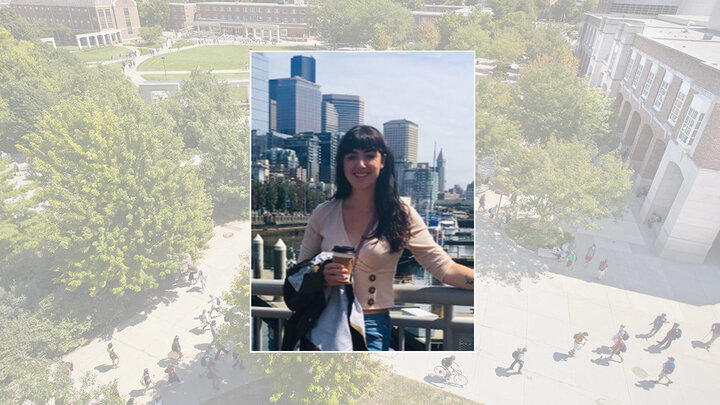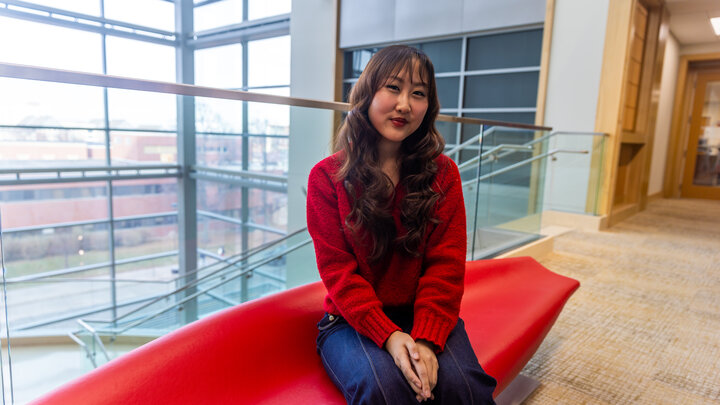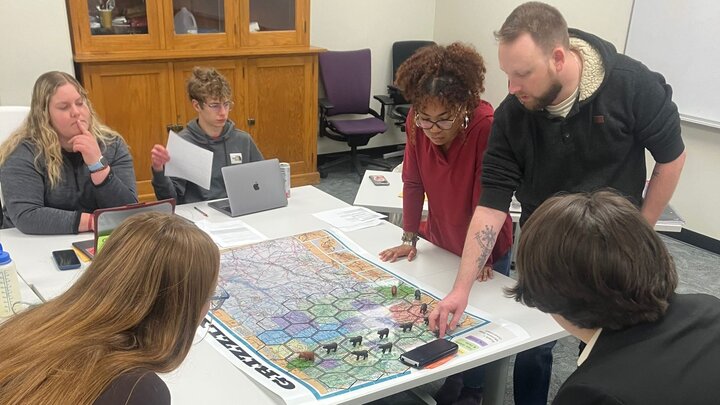Majors and minors: Global Studies ('17), concentration in African Regional Politics, History and Human Rights
Current Program of Study
MA, Humanitarianism and Conflict Response, The University of Manchester
On- and off-campus involvement
- Save South Sudanese Orphans and Widows RSO (former President)
- UCARE Research Assistant to Dr. Dawne Curry in the Departments of History and Ethnic Studies
- Lincoln Literacy ESL Tutor
- Undergraduate Research Assistant with the Department of Sociology's Minority Health Disparities Initiative (MHDI)
- International Teaching Assistants (ITA) Summer Program Classroom Consultant
- Arabic Conversation Table
- International Studies Abroad (ISA) summer program in Morocco
What have you been up to since graduation?
After my graduation from Nebraska, I wanted to put my Global Studies degree to use, and I worked as a Refugee Case Manager at Catholic Social Services where I learned first-hand about the current disasters that are forcing people from their homes en masse and the response of world powers. I spent around one year working in refugee resettlement and valued the part I could play in welcoming refugees to America. Unfortunately, increased immigration scrutiny and heightened security measures against refugees led to dramatic funding cuts for national resettlement programs across the country. These cuts inevitably impacted my own position, which I lost. However, this challenge motivated me to continue pursuing professional work with refugees in other capacities.
In 2017, I helped to establish the non-profit organization Education Refuge alongside its founder, Jacob Manyang. Jacob and I met at a Club Fair in 2015 where he was promoting an RSO that provided humanitarian aid to South Sudanese orphans and widows. Jacob's story revealed to me the urgent need to support the refugee cause overseas and inspired me to join his organization. As an RSO team, we coordinated fundraising projects that afforded us the ability to send Jacob to Kenya where he distributed malaria nets and classroom supplies to five-hundred residents of the Kakuma Refugee Camp.
After seeing the impact of this project, we decided to extend the organization's philanthropy beyond the university campus through the creation of Education Refuge. Currently, I serve as Director of Operations over Education Refuge and we continue to innovate ways to operationalize our mission to 'empower the world's displaced through the provision of sustainable and quality education.' We are always looking for passionate, motivated individuals who are interested in working with us at Education Refuge. We welcome any new faces and ideas to our organization, so please feel free to email us using the contact button on our website and inquire about getting involved!
Why did you decide to get your MA abroad?
There are many reasons why I made the decision to get my master's abroad in Manchester, but here are my top two. First, the master's programs across the UK are more specialized and subsequently, only require one year of study. This does not mean these master's programs are easier than American programs, by any means! Other graduate programs I considered in the U.S. focused more on International Relations and International Development more broadly, whereas I wanted to focus specifically on Humanitarian Response.
Another benefit of pursuing a master's degree in the UK is the abundance of funding opportunities. There are many scholarships available to U.S. students in this regard, including the Marshall and Fulbright Scholarships. Personally, I was awarded the NAFUM Master's Scholarship from the University of Manchester. The potential for scholarships and as well, relatively low costs of attending UK universities given the one-year program duration make them a great option for prospective postgraduate students!
What was the application process like?
The application process was a bit different than that of the U.S. To qualify for postgraduate study at the University of Manchester, I had to write a personal statement, provide two letters of recommendation and prove I could fund the duration of the program using personal and loan monies. One of the great benefits of getting your master's in the UK is that there are no entrance exams required for programs around the arts and humanities! (This may vary across different schools and disciplines- check university sites for their specific entrance requirements). I began the application process well in advance of the deadline. The applications opened in November of 2018, and I submitted my application in late December of 2018. Once accepted, this gave me ample time to apply for the many scholarships available before my official program start date in September of 2019. Always better to work ahead as this gives you options and flexibility, especially when applying for a Student Visa to study and live in the UK.
Why did you choose this program and what were some of the benefits?
I chose to study at the Humanitarianism and Conflict Response Institute (HCRI) as this MA program provides a multidisciplinary approach to humanitarian studies whilst translating theoretical concepts into applied practice through faculty experiences, fieldwork opportunities and strong sector networks. Postgraduate students learn to navigate past and present disaster landscapes through evaluation of international policies, interagency relations, and technical response mechanisms. Additionally, the HCRI encourages postgraduate students to get involved in community organizations across Manchester through internship and volunteer placements.
As for myself, I currently intern with Music Action International. One of Manchester's strongest assets is its breadth of departments and experts who make the HCRI a leading global research institute in the humanitarian field. As a postgraduate student, I learn from humanitarian professionals who encompass a wide range of disciplines within the field. Not only do I have the chance to connect with humanitarian experts and key organizations, but also the ability to participate in international fieldwork opportunities that bring our learning to life. It certainly makes up for the hundreds of journal articles we've been assigned to read!
I chose the University of Manchester as it offers students real-world experiences within the sector unparalleled to other institutions, which are reflected in the postgraduate fieldwork opportunities. Just this past month, I went on a field research trip to Uganda through my course Humanitarianism and Displacement: Researching the Legacies of War. During the trip, we had the opportunity to meet with the Office of the Prime Minister, the United Nations High Commissioner for Refugees (UNHCR), and a multitude of INGOs and NGOs working in refugee affairs and development across Uganda.
One of the questions we were asked throughout our trip to Uganda will stick with me through the remainder of my studies and beyond. During our meetings with community groups and refugees within the Kiryandongo Settlement, we were asked the question, 'Now that we have taken the time to tell you our stories, how will you remember us?' This question is a reminder that what we study through a humanitarian lens of examination reflects the experiences and lived realities of others across the world. Therefore, it is imperative that we as students use the opportunities that our education provides in order to ensure their voices are both heard and accounted for in future policies, discourse and humanitarian operations.
What is your advice for current GLST majors interested in applying for similar opportunities in the future?
I would advise students interested in pursuing similar journeys as myself to create their own opportunities by getting involved both on- and off-campus. Ultimately, this will help to cultivate your own interests and potentially shape the journey you embark on after graduation. Lincoln is a fantastic city for volunteer and work opportunities that help students to 'think globally and act locally.' While your GPA is certainly an important factor when applying to a postgraduate degree in the UK, the universities give a great deal of consideration to students' past involvement, social responsibility and personal journeys. I was inspired to pursue my path to postgraduate studies because of the incredible people I met as a student and working professional in Lincoln. So, take advantage of the global city you live in and get involved!




